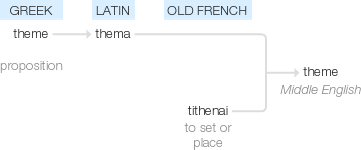Theme
Middle English: via Old French from Latin thema, from Greek, literally ‘proposition’; related to tithenai ‘to set or place’.
wiktionary
From Middle English teme, from Old French teme, tesme (French thème), from Latin thema, from Ancient Greek θέμα(théma), from τίθημι(títhēmi, “I put, place”), reduplicative from Proto-Indo-European *dʰeh₁-(“to put, place, do”) (whence also English do).
etymonline
theme (n.)
early 14c., "subject or topic on which a person writes or speaks," from Old French tesme (13c., with silent -s- "indicating vowel length" [OED], Modern French thème) and directly from Latin thema "a subject, thesis," from Greek thema "a proposition, subject, deposit," literally "something set down," from PIE *dhe-mn, suffixed form of root *dhe- "to set, put." Meaning "school essay" is from 1540s. Extension to music first recorded 1670s; theme song first attested 1929. Theme park is from 1960.
